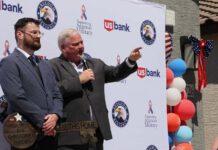
When people think of the Maricopa area’s early days, they likely think of sprawling fields and cattle.
Some may also recall the prominent farming families, whose names now live on street signs throughout the city.
But behind all of the great area farmers transforming the landscape in the 1940s and the years following, the Craig family was quietly and simultaneously making their own history – they were becoming successful black cowboys.
Originally from the small Texas town of Crockett, the Craig family moved to Arizona with Sam Craig Sr., known as “Papa,” to build a better life where the wages for picking cotton were higher. Craig Sr.’s son Sam Craig Jr. later returned home to Texas and met his wife Lizzie Bell McCullough and the pair moved back to the Maricopa/Stanfield area and went on to have a total of seven children.
One of those children is Maricopa resident Sam Craig, who owns Sam Craig Lawns, Sprinklers, and Leaks and lives in Senita with his wife Karen and 13-year-old daughter Kiera.
In honor of February’s Black History Month, Craig talked with InMaricopa and shared some of his family’s memories and history. From stories of movie stars to rodeos and parades, the Craig family has special memories and deep roots in the area and they are proud to be among the early black cowboys.
“It was not very common to be a black cowboy, and my dad was one of the first,” Craig said.
Craig’s father started as a cotton picker and worked for a period of time at the Red River Ranch, owned by movie star John Wayne. According to Craig, the ranch was then overseen by successful cotton farmer and friend of Wayne, Louis Johnson. Craig’s mother Lizzie and her sister Cora Bell McCullough also worked at Johnson’s estate performing general house cleaning duties.
In addition to John Wayne’s farm, Craig’s father also worked for years on another farm near Valley Farms. The days were often 12 hours long and strenuous, but his work ethic and talent took him far. He was eventually promoted from picking cotton to being the head foreman over 21 cotton picking machines and 1,000 acres of land around Maricopa, Stanfield and Valley Farms.
“He is a very sharp and detailed person,” Craig said. “Whatever he does, he wants it to be perfect.”
Craig said his father eventually started caring for horses on the ranch and loved riding them, especially his horse “Chip Jr.”
“He built such a great reputation with the farm owners and ranches…and ultimately he gained respect to participate in the rodeos and parades around Pinal County,” Craig said.
Although Craig’s father was among only a small number of black cowboys at the time, he said his father never felt any different from anyone else.
“He stated that the other cowboys gave him equal treatment and there was no color barrier,” Craig said.
Today, Craig’s father is 84. He retired 30 years ago from his job as a heavy equipment operator at the landfill for the City of Coolidge. Craig’s older brother Alfred Earl Craig Sr. is also a cowboy and rides his horse in parades and rodeos.
Craig’s cousin, Lester Sims, whose family grew up with the Craigs, went on to become a professional rodeo competitor, as a bull rider and bareback bronc rider who competed on the pro circuits for nearly 14 years. Today, the 64-year-old lives in Apple Valley, California, and produces rodeos and trains horses.
Sims also speaks to urban youth about being a cowboy and regularly shares his family’s history with the local community.
“There were a handful of us who blazed the trail for black rodeo associations,” Sims said.
According to the Texas State Historical Association, weekend rodeos featuring black cowboys began in the late 1940s and continue to be popular. These contests flourished largely due to the Negro Cowboys Rodeo Association, formed in 1947 by a group of black businessmen who were ranchers and cowboys in east Texas. Today, the Arizona Black Rodeo is held annually and draws large crowds and big sponsorships. The next one is scheduled for March 7 at Rawhide at Wild Horse Pass.
Sims said during his days on the circuit, he traveled with mostly white men and the group was close-knit and “like family.”
But the prejudice and racism still existed on the outside. Sims recalls times when police had to escort him in and out of stadiums, and he faced danger on the roads when truck drivers honked their horns at him aggressively in an attempt to spook the horses in his trailer.
Still, he said he never feared for his safety because he and his fellow competitors counted on one another.
“We’d go in there and we’d come out together,” Sims said.
Today, many members of the Craig family and their relatives try to carry a bit of their family’s history in their lives every day. For Craig, that meant leaving his job in security in 1990 to do landscaping and irrigation work.
Although the work is on a much smaller scale than the work of his relatives who came before him, he enjoys his connection with the land.

![Maricopa’s ‘TikTok Rizz Party,’ explained One of several flyers for a "TikTok rizz party" is taped to a door in the Maricopa Business Center along Honeycutt Road on April 23, 2024. [Monica D. Spencer]](https://www.inmaricopa.com/wp-content/uploads/2024/04/spencer-042324-tiktok-rizz-party-flyer-web-218x150.jpg)



![Locals find zen with Earth Day drum circle Lizz Fiedorczyk instructs a drum circle at Maricopa Community Center April 22, 2024. [Brian Petersheim Jr.]](https://www.inmaricopa.com/wp-content/uploads/2024/04/PJ_3922-Enhanced-NR-218x150.jpg)


![Shred-A-Thon to take place tomorrow An image of shredded paper. [Pixabay]](https://www.inmaricopa.com/wp-content/uploads/2024/03/shredded-paper-168650_1280-218x150.jpg)




![Alleged car thief released without charges Phoenix police stop a stolen vehicle on April 20, 2024. [Facebook]](https://www.inmaricopa.com/wp-content/uploads/2024/04/IMG_5040-218x150.jpg)



![Maricopa’s ‘TikTok Rizz Party,’ explained One of several flyers for a "TikTok rizz party" is taped to a door in the Maricopa Business Center along Honeycutt Road on April 23, 2024. [Monica D. Spencer]](https://www.inmaricopa.com/wp-content/uploads/2024/04/spencer-042324-tiktok-rizz-party-flyer-web-100x70.jpg)